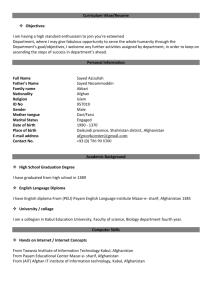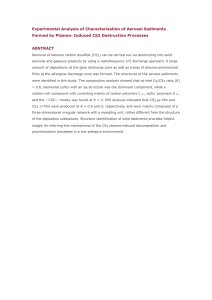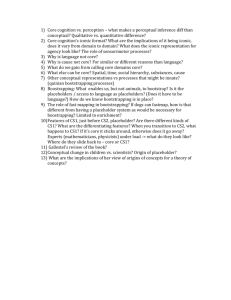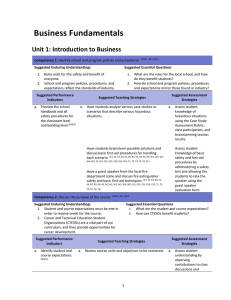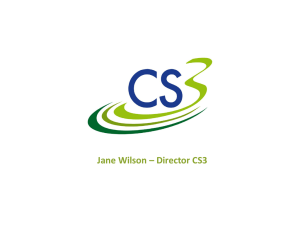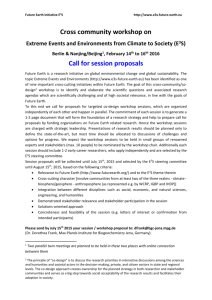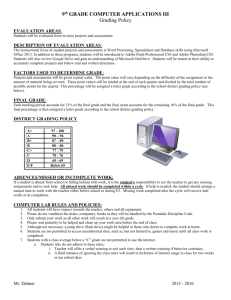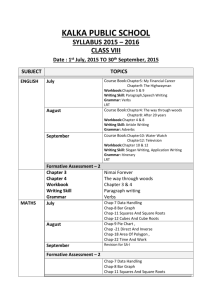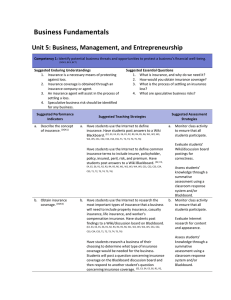RELIGIOUS EDUCATION STANDARDS AND
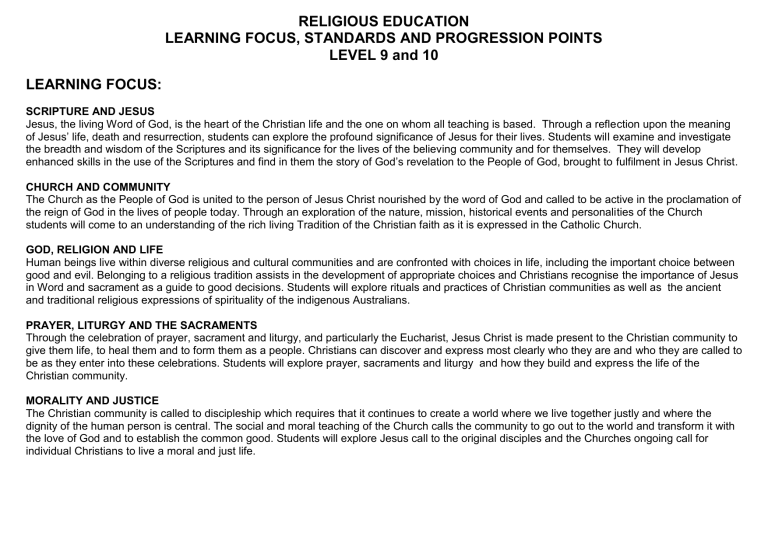
RELIGIOUS EDUCATION
LEARNING FOCUS, STANDARDS AND PROGRESSION POINTS
LEVEL 9 and 10
LEARNING FOCUS:
SCRIPTURE AND JESUS
Jesus, the living Word of God, is the heart of the Christian life and the one on whom all teaching is based. Through a reflection upon the meaning of Jesus’ life, death and resurrection, students can explore the profound significance of Jesus for their lives. Students will examine and investigate the breadth and wisdom of the Scriptures and its significance for the lives of the believing community and for themselves. They will develop enhanced skills in the use of the Scriptures and find in them the story of God’s revelation to the People of God, brought to fulfilment in Jesus Christ.
CHURCH AND COMMUNITY
The Church as the People of God is united to the person of Jesus Christ nourished by the word of God and called to be active in the proclamation of the reign of God in the lives of people today. Through an exploration of the nature, mission, historical events and personalities of the Church students will come to an understanding of the rich living Tradition of the Christian faith as it is expressed in the Catholic Church.
GOD, RELIGION AND LIFE
Human beings live within diverse religious and cultural communities and are confronted with choices in life, including the important choice between good and evil. Belonging to a religious tradition assists in the development of appropriate choices and Christians recognise the importance of Jesus in Word and sacrament as a guide to good decisions. Students will explore rituals and practices of Christian communities as well as the ancient and traditional religious expressions of spirituality of the indigenous Australians.
PRAYER, LITURGY AND THE SACRAMENTS
Through the celebration of prayer, sacrament and liturgy, and particularly the Eucharist, Jesus Christ is made present to the Christian community to give them life, to heal them and to form them as a people. Christians can discover and express most clearly who they are and who they are called to be as they enter into these celebrations. Students will explore prayer, sacraments and liturgy and how they build and express the life of the
Christian community.
MORALITY AND JUSTICE
The Christian community is called to discipleship which requires that it continues to create a world where we live together justly and where the dignity of the human person is central. The social and moral teaching of the Church calls the community to go out to the world and transform it with the love of God and to establish the common good. Students will explore Jesus call to the original disciples and the Churches ongoing call for individual Christians to live a moral and just life.
PROGRESSING TOWARDS LEVEL 10:
CS1 – Scripture and Jesus
CS2
– Church and Community
CS3 – God, Religion and Life
CS4 – Prayer, Liturgy and Sacraments
CS5
– Morality and Justice
Progression Point 8.5
At 8.5, the work of a student progressing towards the standard at Level 10 demonstrates a knowledge and understanding of, for example :
(CS1) literary forms and themes within scripture and their purpose, e.g. the role of prophets.
(CS2) key beliefs of the Church as expressed in the Nicene Creed.
(CS2) the major events, personalities and groups contributing to the emergence and development of the Catholic
Church in Australia.
(CS3) the nature of good and evil in the world.
(CS3) the range of Christian denominations and religious traditions in Australian culture.
@
(CS4) the variety of scriptural perspectives and Church teachings
KNOWLEDGE AND UNDERSTANDING
Progression Point 9.0
At Level 9.0 the work of a student progressing towards the standard at Level
10 demonstrates a knowledge and understanding of, for example:
(CS1) the place of Wisdom and
Prophetic literature in the Bible and the role of Biblical and modern day prophets.
(CS2) links between beliefs expressed in the Nicene Creed and questions asked in today’s world.
(CS2) the experiences of ordinary
Catholics in Australia as their
Church was influenced by rapid social change, e.g. post World War
Two.
(CS3) Gospel symbols of hope compared with those promoted by popular culture.
(CS3) the key dimensions of religious traditions, e.g. rites, practices and beliefs.
@
(CS4) the main ideas contained in special prayers and expressions of
Progression Point 9.5
At 9.5 the work of a student progressing towards the standard at Level 10 demonstrates a knowledge and understanding of, for example:
(CS1) a Gospel identifying issues of authorship, audience, dating,
Jesus’ identity and message, e.g. through parables, miracle stories or passion narrative.
(CS2) distinctive ideas, teachings and practices which arose from significant event/s in Church
History.
(CS2) some of the issues and challenges which confront the
Catholic Church today.
(CS3) how Catholic teachings inform responsible decision-making in regards to popular culture. #
(CS3) areas of unity and diversity among various religious traditions and Christian denominations.
(CS4) how the person and actions of Mary the Mother of God relate to
on Mary.
(CS4) the evolution of selected sacraments throughout the centuries.
(CS5) the values and attitudes promoted by the Ten
Commandments and the
Beatitudes.
(CS5) justice and injustice in the local and wider society, relating them to the values and attitudes promoted by Scripture and Church documents. regard for Mary.
(CS4) the nature, structure and purpose of selected sacraments, e.g. Sacraments of Healing.
(CS5) how the ideals embodied in the Ten Commandments and the
Beatitudes relate to a range of contemporary moral issues.
(CS5) central aspects of justice in the Scriptures and in Catholic social teaching.
# Indicates that this progression point is related to a Year 9 Unit of work.
@ indicates that this progression point is related to a Year 10 Unit of Work. living in contemporary society.
#
(CS4) connections between selected sacraments and the everyday life of the Christian community.
(CS5) the sequence of stages, including the Catholic perspective, in making a decision on a range of moral issues.
(CS5) how an individual or group uses Catholic Social teaching as a guide in their work for justice.
PROGRESSING TOWARDS LEVEL 10:
CS1 – Scripture and Jesus
CS2 – Church and Community
CS3
– God, Religion and Life
CS4
– Prayer, Liturgy and Sacraments
CS5 – Morality and Justice
Progression Point 8.5
At 8.5, the work of a student progressing towards the standard at Level 10 demonstrates skills in reasoning and responding by, for example:
(CS1) comparing and contrasting literary styles used to convey biblical messages and concepts.
(CS2) classifying key Church beliefs, symbols and religious terminology as expressed in the Nicene Creed.
(CS2) investigating the relationship between Catholics and other groups as
European settlement developed.
(CS3) identifying and listing life experiences of good and evil.
(CS3) exploring Christian and other faith traditions.
@
REASONING AND RESPONDING
Progression Point 9.0
At Level 9.0 the work of a student progressing towards the standard at Level
10 demonstrates skills in reasoning and responding by, for example:
(CS1) considering ways in which the wisdom found in writings can be applied to today’s world.
(CS2) summarising and comparing significant periods / events in Church history.
(CS2) researching the events, rituals and practices which characterised different periods in the story of the
Catholic Church in Australia.
(CS3) analysing positive / negative images of good and evil presented in various contexts.
(CS3) researching and classifying information in a variety of formats related to Christian and other faith traditions.
@
Progression Point 9.5
At 9.5 the work of a student progressing towards the standard at Level 10 demonstrates skills in reasoning and responding by, for example:
(CS1) analysing the messages and influences on a Gospel, e.g. the writer, the audience, the social and political situation.
(CS2) researching and analysing the religious, social, political and ideological developments in Church teaching and practice.
(CS2) evaluating a range of viewpoints on significant issues being faced by the Catholic Church in Australia.
(CS3) illustrating contrasting positive / negative values promoted by popular culture and Scripture. #
(CS3) researching and posing questions on key aspects of Christian and other faith traditions.
(CS4) using appropriate religious terminology describing Church teaching about Mary.
(CS4) explaining the Sacraments and their role in the life of the Church and believers.
(CS5) locating the Ten
Commandments and Beatitudes in
Scripture and constructing a contemporary version of these statements.
(CS5) identifying contemporary justice issues underpinned by Scripture.
(CS4) demonstrating an understanding of the historical and contemporary images and prayers relating to Mary.
(CS4) creating a sacramental liturgy plan which identifies the appropriate structure and content.
(CS5) applying the Ten
Commandment and Beatitudes to contemporary life situations.
(CS5) applying the message of Biblical passages and Catholic Social
Teaching to an issue of injustice.
(CS4) applying Marian concepts in the contemporary world.
#
(CS4) proposing ways in which the
Eucharist / Sacraments make sacred the everyday actions of the individual and community.
(CS5) applying the decision making process to specific contemporary life issues.
(CS5) compiling and evaluating information on a range of organisations committed to achieving justice.
# Indicates that this progression point is related to a Year 9 Unit of work.
@ indicates that this progression point is related to a Year 10 Unit of Work.
PROGRESSING TOWARDS LEVEL 10:
CS1 – Scripture and Jesus
CS2 – Church and Community
CS3
– God, Religion and Life
CS4 – Prayer, Liturgy and Sacraments
CS5 – Morality and Justice
PERSONAL AND COMMUNAL ENGAGEMENT
Progression Point 8.5
At 8.5, the work of a student progressing towards the standard at Level 10 demonstrates personal and communal engagement by, for example:
(CS1) identifying a Biblical message and/or character and describing the impact they have had on individuals and/or groups of people.
(CS2) examining how a Church belief or event impacted on the lives of an individual and/or group.
(CS3) reflecting on images about good and evil in different mediums such as music, media and film.
Progression Point 9.0
At Level 9.0 the work of a student progressing towards the standard at Level
10 demonstrates personal and communal engagement by, for example:
(CS1) discussing a Biblical message and/or character and examining the extent to which they have had an impact on individuals and/or groups of people.
(CS2) explaining how beliefs and events in Church history impacted on individuals and/or groups.
(CS3) reflecting and exploring actions that promo te God’s goodness within and between communities.
Progression Point 9.5
At 9.5 the work of a student progressing towards the standard at Level 10 demonstrates personal and communal engagement by, for example:
(CS1) critically evaluating Biblical themes and/or characters and analysing their impact on historical individuals and/or groups today.
(CS2) analysing key beliefs and events in different periods of
Church history and how they impacted on individuals and/or groups.
(CS3) presenting, with supporting evidence, a range of values and understandings of faith that are shared between a variety of communities.
(CS4) reflecting on prayer, liturgy and sacraments throughout
Christian history.
(CS5) participating, with teacher guidance, in local and/or global issues using Christian values.
(CS4) examining the role of prayer, sacraments and liturgy in the life of a
Christian today.
(CS5) participating, with teacher guidance, in decision making about activities related to local and/or global issues using Christian values.
# Indicates that this progression point is related to a Year 9 Unit of work.
@ indicates that this progression point is related to a Year 10 Unit of Work.
(CS4) justifying the role of prayer, sacraments and liturgy in the life of a Christian, with appropriate evidence.
(CS5) initiating an action plan relating to a local and/or global issue using Catholic moral teaching.
LEVEL 10 STANDARDS:
Knowledge and Understanding: At Level 10
(CS1) Students demonstrate an understanding of literary forms, Biblical themes and characters within their historical context.
(CS2) They describe the key beliefs of the Catholic Church and major aspects of its history.
(CS3) Students demonstrate an understanding of God’s presence in the lived experience of individuals and communities.
(CS3) They exhibit an understanding of the religious responses of Ancient and Indigenous peoples and other Christian denominations.
(CS4) Students outline the role of Mary within the Church, and development of prayers and traditions relating to her.
(CS4) They describe the development, structure and significance of selected sacraments.
(CS5) Students use selected Scripture and Catholic Social teaching as a guide to develop an understanding of the value systems in Australia and the principles of social justice.
(CS5) They identify ways in which individuals develop personal responsibility and moral maturity.
Reasoning and Responding: At Level 10
(CS1) Students analyse and interpret the messages in the Scriptures, critically thinking and focusing on Wisdom and Prophetic Literature and
Jesus’ life as recorded in the writing’s of a Gospel.
(CS2) They synthesise the context of the Catholic Church from its beginnings to its development in Australia.
(CS3) Students critique contemporary society in relation to the teachings of the Church.
(CS3) They analyse and differentiate between the Christian denominations and other religious traditions.
(CS4) Students plan, design and facilitate ritual experiences.
(CS5) They apply the principles of justice and compassion to contemporary issues and organisations.
(CS5) Students analyse situations which require moral decision-making.
Personal and Communal Engagement: At Level 10
(CS1) Students explore the extent to which the messages and characters of the Bible impact on themselves and/or groups of people.
(CS2) They review the impact that key Church beliefs and events in history have had on their lives and/or the lives of others.
(CS3) Students explain ways that individuals, groups and faith communities respond to, and live God’s presence in the world.
(CS4) They analyse the role of prayer, liturgy and the sacraments in the lives of themselves and/or others.
(CS5) Students use Catholic moral teaching to respond to issues of injustice in the local and/or global community.
# Indicates that this progression point is related to a Year 9 Unit of work.
@ indicates that this progression point is related to a Year 10 Unit of Work.
